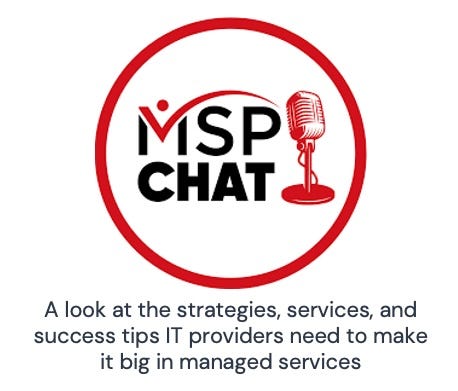Kaseya Wants to Sell AI Through MSPs As Well As To Them
The vendor’s new CEO has AI solutions for end users and an agent marketplace in her plans. Plus: Kaseya’s next-gen MCP interface and Cytracom’s emerging platform play.
Seriously, people, and I shouldn’t have to say it by now. This AI thing isn’t just hype.
“This isn’t Internet of Things version two. This isn’t the metaverse version two or whatever emerging trend you want to take over the last 10 or 20 years,” says Canalys analyst Jay McBain during the latest episode of the podcast I co-host. “This is the next 20-year era in our industry after client-server for 20 years and cloud for 20 years.”
And we’re only two years in, he continues, yet looking already at a $158 billion opportunity growing at 59.3% compounded, just for IT service providers.
“It’s actually the fastest growing service opportunity in the entire tech industry, which is already the fastest growing industry out of all 27 on earth,” McBain observes. And since MSPs are service providers, of course, they must be super excited, right?
Well, they’re super something anyway.
“AI is scaring the shit out of a lot of people,” says Tim Conkle, CEO of mega MSP The 20, whose Vision conference I attended in Dallas last week. As it should, he adds, for multiple reasons beginning with the fact that big, well-capitalized MSPs are investing heavily in AI-based automation. Logically, as we’ve written here recently, has all but turned dispatch over to robots already and New Charter has a whole in-house skunk works team doing nothing but drive similar productivity-boosting innovation. Same goes for The 20, moreover.
“I’ve got a full R&D department,” Conkle says, and it’s getting results. “We’ve totally automated QBRs. We’ve totally automated billing.”
The other reason many MSPs are anxious about AI, though, is that they know the same leading-edge peers having success with AI internally are starting to have success delivering AI solutions to end users as well, and they don’t know how to catch up.
We’ve written multiple times here just in the last few weeks about how companies like Pax8 and IT By Design are racing to provide answers. Based on a second podcast interview that you’ll hear on next week’s episode, however, I can now add another name to the list: Kaseya.
The interview in question is with Rania Succar (pictured), the vendor’s CEO since June, and it reveals ambitious plans to move beyond selling money-saving, technician-facing AI functionality to MSPs toward selling money-making solutions through MSPs to end users as well.
“There’s a tremendous opportunity today for MSPs to take the leading role in retrofitting SMBs to take advantage of this AI revolution,” Succar says.
She’s thinking more specifically of the agentic AI revolution set to generate up to $450 billion in economic value globally by 2028, according to Capgemini. Succar foresees a near-term future in which MSPs consultatively help SMBs grab some of that value using a library of ready-made, vertical-specific agents sourced from a Kaseya marketplace much like the ones Pax8 is developing and SuperOps launched days ago, but with a big difference for the vendor’s partners.
“MSPs rely on the Kaseya stack to run their business, and therefore when we bring them the marketplace it’ll be integrated with everything else they do to run their business,” Succar says. “And the integration will be very deep across everything.”
Par for the course with Kaseya, except in one key respect: not all of those deeply integrated agents will be from Kaseya itself. “You’re going to see some interesting partnership announcements here,” Succar says.
Kaseya has a radically new MCP interface coming
Succar’s plans for AI go beyond customer-facing agents. There are new MSP-facing agents coming as well in areas beyond help desk work.
“It’s not just about profitability, it’s also about growth,” she says. “You think about all the tooling that we can partner with MSPs to put in place to better qualify leads, to more effectively convert leads, to train their go-to-market teams, to be more effective in driving that conversion, to use AI to help package and price offerings.”
Of course, good, clean, centralized data is the precursor to anything useful in AI, so Kaseya has plans there too. “Typically, MSPs and SMBs use dozens of different applications to run their business, and as a result all the data’s fragmented,” says Succar, who without getting into specifics suggests there are solutions coming that will help MSPs both consolidate their own data and sell data consolidation services to end users.
In parallel with that, meanwhile, Kaseya plans to centralize its own data as well to support “an integrated IT orchestrator for MSPs, so they can operate across the entire suite in seamless ways with deep, deep integration,” Succar says.
That “orchestrator,” she adds, will use MCP, and as regular readers know, interesting things happen these days when vendors centralize their data and connect it to MCP. Remember when an MSP I spoke to opened my mind to the who-knows, someday possibility of RMM, PSA, and other managed service apps using natural language chatbot interfaces? And then, a week later, when I discovered that data protection vendor Slide was living in that who-knows, someday future right now? Well, Kaseya’s on its way there too.
“The possibilities are unbelievably exciting,” Succar says. “It will no longer be coming into the interface that exists today. It’ll be much more oriented around a single interface where you can have a conversation around, ‘here’s what I’d like to do,’ and you can ask it questions.”
Users can expect to start seeing the new-look interface next year, she adds. “This is something that is not far away.”
Speaking of innovative interfaces…
I wrote a few weeks ago about Cyft, one of several startups using AI to accelerate MSP growth in interesting ways. Cyft turns out to have been a sponsor of Vision, which gave me a chance to get my first demo of Sam, the vendor’s debut product, last week.
Captured on video, it simulated a technician helping an end user resolve a printer malfunction. Perfectly ordinary stuff until the tech and customer each hung up, at which point Sam, which had been silently and invisibly listening in the whole time, automatically created detailed, well-organized documentation, time stamped the ticket, and marked it closed while the technician was already on to supporting another customer.
All very useful for seeing the tech Cyft told me about before at work. What really grabbed my attention, though, was a piece of the demo in which the technician made several PSA updates by voice. As in he just said what he wanted the PSA to do out loud and it happened, no typing in a chatbot interface required. That I hadn’t heard about before.
“There’s a lot you haven’t heard about,” said James Farrow, Cyft’s co-founder and CEO (pictured), with a smile.
Managed services software interfaces, I’m belatedly realizing, are going to start getting radically different and very interesting pretty soon. In Cyft’s case, at least, that will begin happening October 1st, when Sam reaches market.
Four final notes about change afoot at Kaseya
Those marketplace partnerships I mentioned before are old hat to ConnectWise, but new for Kaseya. Here are four more changes coming to the company under Succar’s leadership.
1. More love for bigger buyers. Small, young MSPs aren’t just OK with one-size-fits-all software. They want it, because customizing and configuring a toolset takes time and skills they don’t yet have. When you get to be the size of today’s mega MSPs and start serving fairly large businesses, however, off-the-rack, all-in-one applications start losing their appeal. So too, not surprisingly, do vendors that refuse to help big ticket buyers customize their tool stack.
“This is what this industry is about to get an awakening to,” said someone associated with a fairly large MSP rollup off the record not long ago. “If you want us to keep paying this $10 million a year bill, we need you to probably do this. None of these companies is used to that.”
Kaseya, however, appears to be getting the message. “I’ve spent a lot of time with the larger consolidating MSPs,” Succar says. “What we hear from them consistently is they need a toolset that gives them flexibility and allows them to differentiate their offering and to be premium solutions in the market.” As a result, she continues, ensuring “all of our solutions give them the APIs, the customization that they need to grow” will be a new priority going forward.
2. More co-sales and marketing. The other message Succar is getting from larger MSPs is that they want more than software and support from companies like Kaseya. They want direct assistance with organic growth.
“We’ve heard loud and clear that this is a top ask and we’re committed to bringing some exciting announcements in this space,” Succar says. That’s about as specific as she’s comfortable being right now, except to share a “menu” of items that might arrive someday soon.
“Kaseya itself gets a lot of inbound leads from SMBs. We have the opportunity to pass those back to top partners in the Kaseya ecosystem,” Succar says. “We have an opportunity to sell with our MSPs, for them to register the deals that we’re working on, and for our direct go-to-market teams to be partnering with our MSPs to close those deals.”
And yes, she’s well aware of how nervous MSPs get whenever vendors start talking about selling alongside them. “We will announce some very clear lines of companies below this size, for example, will never be worked through Kaseya,” Succar says. “We want our MSPs to win. When they win, we win. It’s very clear. And so we need to be very clear about what those demarcations will be, and we will communicate them.”
3. More focus on customer experience. I first wrote about the importance of partner satisfaction at Kaseya over a year ago. Succar, however, intends to double down in that area.
“We will be committed to delivering end-to-end exceptional experiences for our customers,” she says.
The number one example of how and where partners will feel the difference, she continues, involves a familiar complaint. “One of the top things that our MSPs have said over and over again is the Kaseya billing model is rigid, the contracting model is rigid, and we’re working significantly to improve that,” Succar says.
Kaseya’s devotion to customer experience will yield results in additional areas though, she promises, such as onboarding: “It will feel very seamless, very integrated, very tech forward, and very focused on sharing all the best practices we’ve seen.”
And if speaking with a Kaseya account rep has ever put you on the receiving end of a hard sell, you’ll probably like the sound of this pledge too. “When customers are engaging with our account managers, it won’t feel like a sales transaction. It’ll feel like a partnership transaction,” Succar says, adding that account managers will be measured at least in part by the success of the MSPs they support versus the sales revenue they book.
4. More investment in community. Regular readers may recall a story from March about how ConnectWise CEO Manny Rivelo knew the company’s partner community was an important asset when he stepped into his new job but didn’t fully appreciate how important until the first time he attended an IT Nation conference. Succar too, it seems, has seen the power of community early in her tenure.
“One of the things that’s really unique about the MSP ecosystem is the degree to which the MSP owners feel a sense of community and want to help each other and want to lean together to share best practices and exchange best practices,” she says. Kaseya does a good job of facilitating that collaboration, she continues, but it hasn’t “scaled to its full potential,” so she intends to invest in unspecified online resources that will give more MSPs more access to community programs like peer groups.
“This is about moving from a model we know works but doesn’t scale significantly to bringing technology to help it scale much more broadly,” Succar says.
One more reason to listen to my podcast
Succar covers a whole lot more ground in her podcast interview than I have in this post, so if you don’t already, I encourage you to subscribe now. It’ll give you immediate access to that Jay McBain interview I mentioned before and ensure that you’re notified when the episode with the Succar interview drops as well.
Cytracom’s platform roadmap comes into focus
When I first met the team at Cytracom some years back, they were a unified communications vendor. That made the company’s 2022 introduction of ControlOne, a SASE solution, puzzling until Cytracom executives explained that a voice service worth paying for requires secure, stable connectivity and ControlOne would ensure that’s available. So from the cheap seats, at least, Cytracom was still primarily a VoIP vendor. It just now had an MSP- and SMB-friendly networking and security tool as well.
The picture started getting more complicated early this year, though, when Cytracom announced its acquisition of Telivy, a vulnerability management vendor. You could argue that Telivy’s software was a great tool for exposing vulnerabilities that businesses could then address by deploying ControlOne, which in turn remained a great foundation for selling voice services. But it became clear that Cytracom had different, bigger plans in mind when it described the Telivy deal in a press release as “another milestone in the company’s evolution to deliver a comprehensive technology platform for MSPs.”
Yes, but what kind of platform? The answer was unclear, to me at least, until a conversation with John Tippett (pictured), Cytracom’s COO, at Vision last week about a more recent acquisition began bringing it into focus.
The acquisition I’m alluding to happened in June, when Cytracom bought Tentacle, a governance, risk, and compliance vendor. This time the press release called the transaction “a significant advancement in Cytracom’s Security Risk Management (SRM) strategy” that “further aligns with the company’s mission to empower MSPs to grow beyond traditional IT services and embrace a more strategic advisory role.”
And it’s growing easier to see what that means. It’ll take a bit, but eventually Telivy’s software will arm MSPs to inventory vulnerabilities in end user environments and feed them to Tentacle’s solution, which will map them against a variety of security frameworks, cyber insurance requirements, and regulatory mandates. Want to eliminate those compliance gaps? Simply deploy ControlOne.
“You can do a risk assessment and find problems, and when you win the client and deploy SASE, you could think, ‘single click, make these problems go away,’ and SASE can take action based off of the risk assessment,” Tippett says.
All of that’s one-time project work, but Telivy does vulnerability monitoring as well as assessment. So once that system, Tentacle, and ControlOne are all in place an MSP can use them not just to create compliance policies but to enforce them in real time. Cytracom must do three things before it can realize that vision, though:
Create a shared identity management foundation for its various solutions
Use that foundation to integrate those solutions more closely with one another
Retune Tentacle’s app, which was designed for use in enterprise IT departments, for MSPs
That process, which will take time, is already underway. Cytracom, in fact, began a staged rollout of Unity, the identity management foundation that makes everything else possible, week before last. When the process is complete by end of summer, Tippett says, “we’ll start connecting all of these dots together.” And when that process is complete, ControlOne will start automatically isolating vulnerable endpoints in response to real-time signals from Telivy and Tentacle until a technician implements a fix.
But why, in the emerging age of agentic AI, require technicians to get involved at all? Eventually, Tippett suggests, Cytracom’s platform will remediate compliance issues autonomously. Look even further out, he hints, and you can imagine the company identifying and addressing compliance deviations in areas beyond the network that a SASE solution can’t touch. Will the portfolio expand to accommodate that?
“It absolutely will,” Tippett says, through a combination of building, buying, and—most intriguingly—partnering.
“We have several partnerships that we’ve not announced yet that we’re working on that will be more of an ecosystem play,” Tippett says.
Also worth noting
ConnectWise has launched an AI-powered email security and training solution in partnership with fellow Thoma Bravo portfolio vendor Proofpoint.
Kaseya has released CMMC Customer Responsibility Matrices for Datto RMM, VSA, IT Glue, and others of its solutions.
Need more time getting customers off of Windows 10? Microsoft will begin making extended security updates available to those willing to pay for them on September 1st.
Xurrent, who you’ve met here before, has added AI-based ticketing, summarization, rule generation, and more to its service management platform for MSPs.
LastPass now supports passkeys.
Keeper Security’s Chrome/Edge browser extension and command line interface now feature biometric login.
SailPoint has released an AI-enabled application management solution designed to support automated discovery, risk-based prioritization, and onboarding.
Rapid7’s new Vector Command Advanced solution adds continuous pen testing and compliance validation to its attack surface management platform.
DTEX has introduced an AI-driven, risk-adaptive data loss prevention solution that continuously learns from workforce behavior.
Druva has infused its data security platform with AI agents that interpret user intent, analyze data, and act autonomously on what they see.
Keepit’s SaaS backup and recovery solution is now available in Canada through Ingram Micro.
LevelBlue, an MSSP, has completed its acquisition of fellow MSSP Trustwave.
Abstract Security has launched a new partner program for resellers, MSPs, MSSPs, and integrators.
Mega MSP Thrive has unveiled a real-time, AI-powered network detection and response service.
SonicWall has promoted Michael Crean, formerly EVP of managed security services, to general manager of its new Managed Security Services division.
Justin Crotty is the new vice president of services for North America at Exclusive Networks, as well as general manager of the disti’s Cloudrise security services unit.
OpenText has joined HPE’s Unleash AI partner initiative to deliver pre‑validated, secure, and scalable enterprise-grade AI solutions.
Schneider Electric’s new Power Infrastructure Assessment is designed to help partners identify UPS issues, inefficiencies, and capacity gaps.







